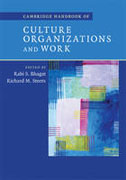
The Cambridge handbook of culture, organizations, and work
Bhagat, Rabi S.
Steers, Richard M.
It is now widely recognised that countries around the world are becoming increasingly interconnected, and that both public and private organizations are ofnecessity becoming increasingly global. As political, legal, and economic barriers recede in this new environment, cultural barriers emerge as a principal challenge to organizational survival and success. It is not yet clear whether these new global realities will cause cultures to converge, harmonize, and seek common ground or to retrench, resist, and accentuate their differences. In either case, it is of paramount importance for both managers and organizationalscholars to understand the cultural crosscurrents underlying these changes. With contributions from an international team of scholars, the Handbook of Culture, Organizations, and Work reviews, analyses, and integrates available theory and research to give the best information possible concerning the role of culture and cultural differences in organizational dynamics. INDICE: List of figures; List of tables; List of contributors; Preface Rabi S. Bhagat and Richard M. Steers; Part I. Cultural Foundations: 1. The culture theory jungle: convergence and divergence in models of national culture Luciara Nardon and Richard M. Steers; 2. Culture, organizations, and institutions:an integrative review Kwok Leung and Soon Ang; 3. When does culture matter? Cristina B. Gibson, Martha Maznevski, and Bradley Kirkman; Part II. Culture andOrganization Theory: 4. Culture and organization design: strategy, structure,and decision-making Richard M. Steers, Luciara Nardon, and Carlos Sanchez-Runde; 5. Cross-cultural perspectives on international mergers and acquisitions Gunter K. Stahl and Mansour Javidan; 6. Global culture and organizational processes Miriam Erez and Gili Drori; 7. Cultural variations in the creation, diffusion, and absorption of organizational knowledge Rabi S. Bhagat, Annette S. McDevitt, and Ian McDevitt; 8. Cultural variations and the morphology of innovation John Kimberly and Colleen Beecken Rye; Part III. Culture and Organizational Behavior: 9. Leadership across cultures Marcus W. Dickson, Deanne N. Den Hartog, and Nathalie Castano; 10. Global leadership: progress and challenges Joyce Osland, Sully Taylor, and Mark Mendenhall; 11. The role of cultural elementsin virtual teams Taryn L. Stanko and Cristina B. Gibson; 12. Cultural driversof work behavior: personal values, motivation, and job attitudes Carlos Sanchez-Runde, Sang Myung Lee, and Richard M. Steers; 13. Culture, conflict, and negotiation: interdisciplinary perspectives Lynn Imai and Michele Gelfand; 14. The complexity of trust: cultural environments, trust, and trust development Nancy R. Buchan; 15. Cultural variations in work stress and coping in an era of globalization Rabi Bhagat, Paula Steverson, and Ben Kuo; 16. Cultural values and women's work and career experiences Ronald J. Burke; 17. Intercultural training for the global workplace: review, synthesis, and theoretical explorationsDharm P. S. Bhawuk; Part IV. Future Directions in Theory and Research: 18. Improving methodological robustness in cross-cultural organizational research Fons J. R. van de Vijver and Ron C. Fisher; 19. Culture, work, and organizations: a future research agenda Rabi S. Bhagat; Name index; Subject index.
- ISBN: 978-0-521-87742-8
- Editorial: Cambridge University Press
- Encuadernacion: Cartoné
- Páginas: 536
- Fecha Publicación: 01/01/2009
- Nº Volúmenes: 1
- Idioma: Inglés
